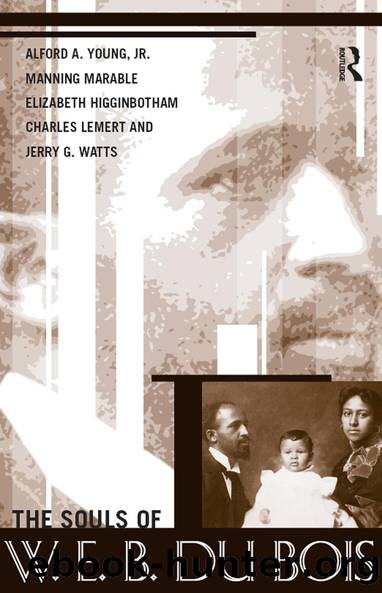Souls of W.E.B. Du Bois by unknow

Author:unknow
Language: eng
Format: epub
ISBN: 9781317251651
Goodreads: 41388775
Publisher: Routledge
Published: 2006-02-01T00:00:00+00:00
This, the most famous of all lines in the book, set the tone for the laments that run through the book as a whole, but the lamentations are always glossed, as here, by the gift of second sightâthe power that comes to those who, while held in contempt, exploit the shadows to see the world more deeply. The veil, like the color line, is a poetic figure, but it conveys a strong theoretical principle, one that is close by those of Freud and Einstein. If you reverse the naive time of social progress, you will discover the hidden social spaces on the other side of the line. Within these spaces mysteries are heldâmysteries not unique to those there relegated, but general to the whole of a world that allows, against its own professed ideals, such a space to stand as it does against the self-conscious pretense of the Good Society.
Hence, the rhizomatic connection to Freud and Einstein, a sketchâif not a robust social theory of modern realitiesâof realities that were, in the first five or so years of the twentieth century, already being reconsidered with respect to the interior space of the psyche and to the far exterior space of the universe. What Du Bois did in Souls was to write the general theory of social relativity by interpreting the dream of the modern worldâand nowhere more painfully than in the bookâs fourth essay, âOf the Meaning of Progress.â Inasmuch as his great European sociological contemporaries, Emile Durkheim and Max Weber, were doing something quite similar at about the same time, it is not the stretch it may seem to say that, among them, Du Bois was the poetic sociologist who wrote in the metaphoric language that was required to utter the harsh truths the others were aware of but could not quite believe.
As it happens, two key texts by Du Boisâs European contemporaries reflected, if not quite as overtly, just the same readiness to contend with the social meanings of time in Western places. One of them was, oddly, related to Souls. That one was Max Weberâs The Protestant Ethic and the Spirit of Capitalism, which, like Souls, was cobbled together out of essays. Weber had emerged from his long depression to write in 1904â05 a series of essays on the question of the social origins of capitalism. In this period he made his famous visit to the United States, which included a visit with Du Bois in Atlanta the summer of 1904. Weber offered to broker a German translation of Souls, which he much admired. It is likely that Weberâs American visit that summer sealed his conviction as to the central theme of Protestant Ethicâthat capitalism arose first as an ethical spirit that was nowhere more apparent in that day than in the United States. Surely, Weber had seen or heard of Du Boisâs studies of the hardworking blacks of the rural South, which were in fact the occasion for the summer conferences that drew Weber to Atlanta.
Download
This site does not store any files on its server. We only index and link to content provided by other sites. Please contact the content providers to delete copyright contents if any and email us, we'll remove relevant links or contents immediately.
| African American | Asian American |
| Classics | Anthologies |
| Drama | Hispanic |
| Humor | Native American |
| Poetry | Southern |
Crazy Rich Asians by Kevin Kwan(9271)
How to Bang a Billionaire by Alexis Hall(8137)
Giovanni's Room by James Baldwin(7315)
Win Bigly by Scott Adams(7182)
Little Fires Everywhere by Celeste Ng(7178)
Pachinko by Min Jin Lee(5676)
Tease (Temptation Series Book 4) by Ella Frank(5624)
The Fire Next Time by James Baldwin(5421)
The Perks of Being a Wallflower by Stephen Chbosky(4632)
China Rich Girlfriend by Kwan Kevin(4555)
Bluets by Maggie Nelson(4542)
First Position by Melissa Brayden(4517)
The Sympathizer by Viet Thanh Nguyen(4382)
Rich People Problems by Kevin Kwan(4279)
A Little Life (2015) by Hanya Yanagihara(4273)
Right Here, Right Now by Georgia Beers(4194)
Walking by Henry David Thoreau(3949)
Catherine Anderson - Comanche 03 by Indigo Blue(3618)
The Death of the Heart by Elizabeth Bowen(3601)
